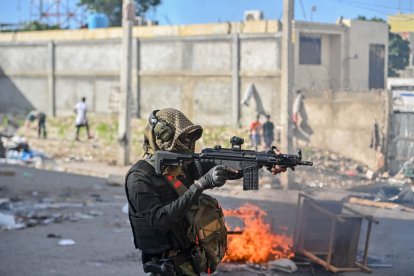Haiti plunged into a wave of violence: Kenya and Benin will intervene to contain the gangs
The country accepted international military aid amid a rise in crime that it has been unable to control.

A policeman points a gun at protesters during a demonstration calling for the resignation of Prime Minister Ariel Henry in Port-au-Prince on February 7, 2024. (Photo by Richard PIERRIN / AFP)
This Friday, Kenya and Benin confirmed their commitment to send thousands of soldiers and police to Haiti, with the aim of mitigating the violent crime wave taking place in the Caribbean country. This decision came after a new episode of violence triggered by the call of the leader of a dangerous criminal gang to armed groups to “act and achieve the resignation” of the Haitian Prime Minister, Ariel Henry.
While Ariel Henry went to Kenya to coordinate the deployment of a foreign armed force to combat gangs in Haiti, the leader of a dangerous criminal gang, Jimmy Chérizier, alias “Barbecue, “announced a coordinated offensive to force the resignation of the prime minister. This episode resulted in the tragic loss of four police lives and five others being injured.
“Today, we announce that all armed groups are going to act to obtain the resignation of Prime Minister Ariel Henry. We will use all strategies to achieve this goal,” Chérizier said in a video posted on social media.
Shortly after, the sound of gunshots echoed throughout Port-au-Prince, resulting in the closure of businesses, government agencies, and schools. In addition, at least one airline decided to suspend all its flights.
“Yesterday’s situation was horrible. The center of the city was at war,” said Haitian Police spokesman Garry Desrosiers.
The U.S. Embassy in Haiti issued a statement stressing that "U.S. citizens in Haiti should depart Haiti as soon as possible by commercial or other privately available transportation options, in light of the current security situation and infrastructure challenges."
"U.S. citizens wishing to depart Port-au-Prince should monitor local news and information on security conditions from commercial transportation providers and should arrange to leave Haiti when security conditions permit doing so," wrote the U.S. Embassy.
The situation in Haiti
The latest incident adds to a series of bloody events that have marked Haiti since 2021, when President Jovenel Moïse was assassinated, triggering an increase in efforts by armed gangs to take control of various parts of the country.
The crisis, which encompasses economic, political and security aspects, has worsened over time, resulting in the significant loss of territorial control by the authorities and a growing impact on the population. A UN report reveals alarming figures, indicating that in 2023 alone 4,789 people lost their lives, 1,698 were injured and 2,490 were kidnapped. These statistics continue to increase.
U.N. confirms sending thousands of soldiers to Haiti
In an effort to stop the wave of violence in the Caribbean country, Kenya agreed to deploy around a thousand police officers to Haiti. Benin is also joining the efforts by sending 1,500 soldiers as part of the multinational security support mission, an initiative approved by the U.N. in October last year.
The Spokesperson for the Secretary General of the U.N., Stéphane Dujarric, announced that other countries, such as the Bahamas, Bangladesh, Barbados and Chad, will collaborate in the mission, although the exact number of personnel they will provide has not been determined.
Despite these efforts, the situation in Haiti remains delicate and may require further action to address the crisis that has led thousands of Haitians to seek refuge in other parts of the world.
Increase in Haitian migration to the United States
The United States has become one of the favorite destinations for Haitians since the mid-20th century. In 2022, approximately 731,000 Haitian immigrants were already residing in the country, representing the fifteenth largest foreign-born population, and according to a report from the Migration Policy Institute (MPI), the irregular immigration to the U.S. of this nationality has been increasing.
Between fiscal years 2022 and 2023, U.S. authorities detected Haitians on the Mexican border on more than 76,100 occasions. Additionally, the United States Coast Guard intercepted approximately 7,200 Haitians at sea during fiscal year 2022, evidencing a considerable increase in migration.
Since then, the Biden Administration has made it easier for thousands of Haitians to enter by expanding an immigration permit program for those with a U.S. sponsor and traveling by air. This program grants beneficiaries conditional freedom to reside and work in the United States for two years, and until September 2023, 85,300 benefited from this measure. Additionally, Temporary Protected Status (TPS), which provides work authorization and protection from deportation, covers more than 116,500 Haitians as of March 2023.
RECOMMENDATION





















